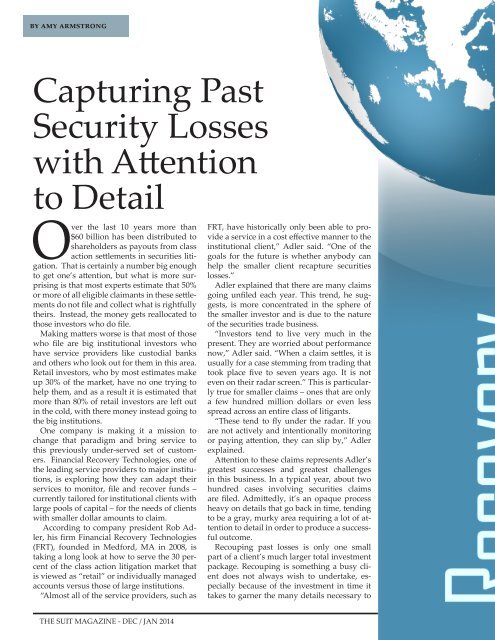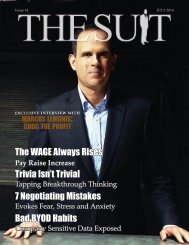GAME OF DRONES
The drone revolution has finally entered the American psyche. In fact, in late-December, the Federal Aviation Administration revealed that they have chosen several sites in a number of states to test unmanned drones in order to integrate them into our national airspace. The climate has certainly changed and unmanned aerial vehicles, or drones - will be written by professional journalists, who offer a fresh perspective and an objective eye that will give you a well-rounded look at big topics. Our reporters L.A. Rivera, Amy Armstrong and Monica Link have chronicled a story dubbed, “Year Of The Drones,” which looks into the future of drones in America.
The drone revolution has finally entered the American psyche. In fact, in late-December, the Federal Aviation Administration revealed that they have chosen several sites in a number of states to test unmanned drones in order to integrate them into our national airspace. The climate has certainly changed and unmanned aerial vehicles, or drones - will be written by professional journalists, who offer a fresh perspective and an objective eye that will give you a well-rounded look at big topics. Our reporters L.A. Rivera, Amy Armstrong and Monica Link have chronicled a story dubbed, “Year Of The Drones,” which looks into the future of drones in America.
Create successful ePaper yourself
Turn your PDF publications into a flip-book with our unique Google optimized e-Paper software.
y amy armstrong<br />
Capturing Past<br />
Security Losses<br />
with Attention<br />
to Detail<br />
Over the last 10 years more than<br />
$60 billion has been distributed to<br />
shareholders as payouts from class<br />
action settlements in securities litigation.<br />
That is certainly a number big enough<br />
to get one’s attention, but what is more surprising<br />
is that most experts estimate that 50%<br />
or more of all eligible claimants in these settlements<br />
do not file and collect what is rightfully<br />
theirs. Instead, the money gets reallocated to<br />
those investors who do file.<br />
Making matters worse is that most of those<br />
who file are big institutional investors who<br />
have service providers like custodial banks<br />
and others who look out for them in this area.<br />
Retail investors, who by most estimates make<br />
up 30% of the market, have no one trying to<br />
help them, and as a result it is estimated that<br />
more than 80% of retail investors are left out<br />
in the cold, with there money instead going to<br />
the big institutions.<br />
One company is making it a mission to<br />
change that paradigm and bring service to<br />
this previously under-served set of customers.<br />
Financial Recovery Technologies, one of<br />
the leading service providers to major institutions,<br />
is exploring how they can adapt their<br />
services to monitor, file and recover funds –<br />
currently tailored for institutional clients with<br />
large pools of capital – for the needs of clients<br />
with smaller dollar amounts to claim.<br />
According to company president Rob Adler,<br />
his firm Financial Recovery Technologies<br />
(FRT), founded in Medford, MA in 2008, is<br />
taking a long look at how to serve the 30 percent<br />
of the class action litigation market that<br />
is viewed as “retail” or individually managed<br />
accounts versus those of large institutions.<br />
“Almost all of the service providers, such as<br />
FRT, have historically only been able to provide<br />
a service in a cost effective manner to the<br />
institutional client,” Adler said. “One of the<br />
goals for the future is whether anybody can<br />
help the smaller client recapture securities<br />
losses.”<br />
Adler explained that there are many claims<br />
going unfiled each year. This trend, he suggests,<br />
is more concentrated in the sphere of<br />
the smaller investor and is due to the nature<br />
of the securities trade business.<br />
“Investors tend to live very much in the<br />
present. They are worried about performance<br />
now,” Adler said. “When a claim settles, it is<br />
usually for a case stemming from trading that<br />
took place five to seven years ago. It is not<br />
even on their radar screen.” This is particularly<br />
true for smaller claims – ones that are only<br />
a few hundred million dollars or even less<br />
spread across an entire class of litigants.<br />
“These tend to fly under the radar. If you<br />
are not actively and intentionally monitoring<br />
or paying attention, they can slip by,” Adler<br />
explained.<br />
Attention to these claims represents Adler’s<br />
greatest successes and greatest challenges<br />
in this business. In a typical year, about two<br />
hundred cases involving securities claims<br />
are filed. Admittedly, it’s an opaque process<br />
heavy on details that go back in time, tending<br />
to be a gray, murky area requiring a lot of attention<br />
to detail in order to produce a successful<br />
outcome.<br />
Recouping past losses is only one small<br />
part of a client’s much larger total investment<br />
package. Recouping is something a busy client<br />
does not always wish to undertake, especially<br />
because of the investment in time it<br />
takes to garner the many details necessary to<br />
THE SUIT MAGAZINE - DEC / JAN 2014










